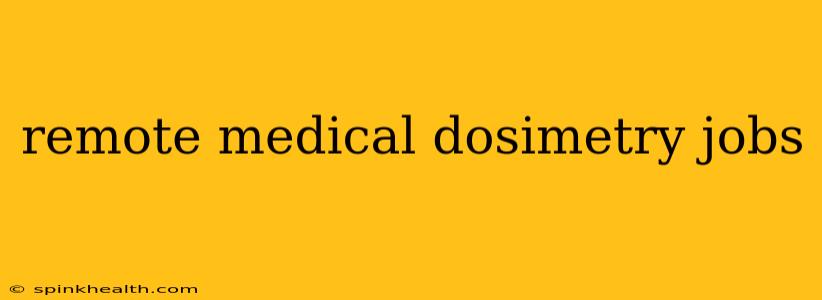Charting a New Course: The Rise of Remote Medical Dosimetry Jobs
The world of medical physics is transforming, and at the heart of this change is the exciting growth of remote medical dosimetry jobs. No longer confined to the walls of a hospital or clinic, skilled dosimetrists are now leveraging technology to deliver precise radiation treatments from anywhere with a reliable internet connection. This opens up a world of opportunities for professionals seeking flexibility, work-life balance, and the chance to impact patient care on a broader scale. But what does it truly mean to be a remote medical dosimetrist? Let's dive into this evolving field and explore its unique facets.
What is a Medical Dosimetrist?
Before we delve into the remote aspect, let's establish a foundational understanding. A medical dosimetrist is a highly skilled healthcare professional responsible for calculating and delivering precise radiation doses to cancer patients undergoing radiotherapy. They are the meticulous architects of treatment plans, ensuring that the radiation targets the tumor while minimizing damage to surrounding healthy tissues. This requires a deep understanding of anatomy, physics, and advanced treatment planning software. Their work is critical for successful cancer treatment and patient well-being.
What Does a Remote Medical Dosimetrist Do?
The core responsibilities of a remote dosimetrist mirror those of their on-site counterparts. The key difference lies in the where and how. Instead of working within a physical treatment center, remote dosimetrists utilize secure, cloud-based platforms to access patient data, plan treatments, and collaborate with medical physicists and other members of the healthcare team. Their day might involve:
- Treatment Planning: Using sophisticated software, they design individual radiation treatment plans, carefully considering tumor location, size, and proximity to critical organs.
- Data Analysis: They meticulously review patient imaging (CT scans, MRIs) and medical records to ensure accurate treatment planning.
- Quality Assurance: They perform rigorous quality checks on their work and collaborate with colleagues to maintain the highest standards of accuracy and patient safety.
- Collaboration: They communicate effectively with on-site clinicians via video conferencing, secure messaging, and other digital tools.
What are the Benefits of a Remote Medical Dosimetry Job?
The advantages of working remotely in this field are compelling:
- Flexibility and Work-Life Balance: Remote positions often offer more control over work schedules and location, allowing for better integration of personal and professional life.
- Geographic Independence: No longer limited by proximity to a physical clinic, dosimetrists can live and work from anywhere with a stable internet connection.
- Increased Job Opportunities: The remote model expands the pool of potential employers and candidates, creating more job options.
- Potential for Higher Earning: Depending on experience and location, remote dosimetrists might command competitive salaries.
What are the Challenges of a Remote Medical Dosimetry Job?
While the advantages are significant, it's important to acknowledge the challenges:
- Technology Dependence: A stable and reliable internet connection is essential, and technical issues can impact workflow.
- Communication and Collaboration: Effective communication and collaboration are crucial, requiring strong interpersonal and technical skills to navigate virtual interactions.
- Security and Compliance: Protecting sensitive patient data necessitates adherence to strict security protocols and compliance regulations.
- Isolation: Working remotely can sometimes lead to feelings of isolation, requiring proactive efforts to maintain professional connections.
What Qualifications are Needed for Remote Medical Dosimetry Jobs?
The qualifications for remote dosimetry positions are generally similar to those for on-site roles. Expect to see requirements for:
- Certification: American Registry of Radiologic Technologists (ARRT) certification in radiation therapy is often a must.
- Education: A bachelor's or associate's degree in radiation therapy or a related field is typically required.
- Experience: Prior experience in medical dosimetry is highly desirable.
- Technical Skills: Proficiency in treatment planning software (e.g., Eclipse, Pinnacle) is essential.
How Do I Find Remote Medical Dosimetry Jobs?
Searching for remote dosimetry jobs requires a strategic approach:
- Online Job Boards: Utilize job boards specializing in healthcare and remote work opportunities.
- Networking: Connect with professionals in the field through online communities and professional organizations.
- Company Websites: Directly check the career pages of healthcare organizations known for offering remote positions.
Is Remote Medical Dosimetry the Future?
The answer is a resounding yes. As technology advances and the healthcare industry embraces remote work models, the demand for skilled remote medical dosimetrists is poised for significant growth. This field offers a rewarding career path for those who seek flexibility, challenge, and the profound satisfaction of contributing to patient care in a cutting-edge way. The future of medical dosimetry is not just about precision; it's about accessibility and innovation—and that future is increasingly remote.

